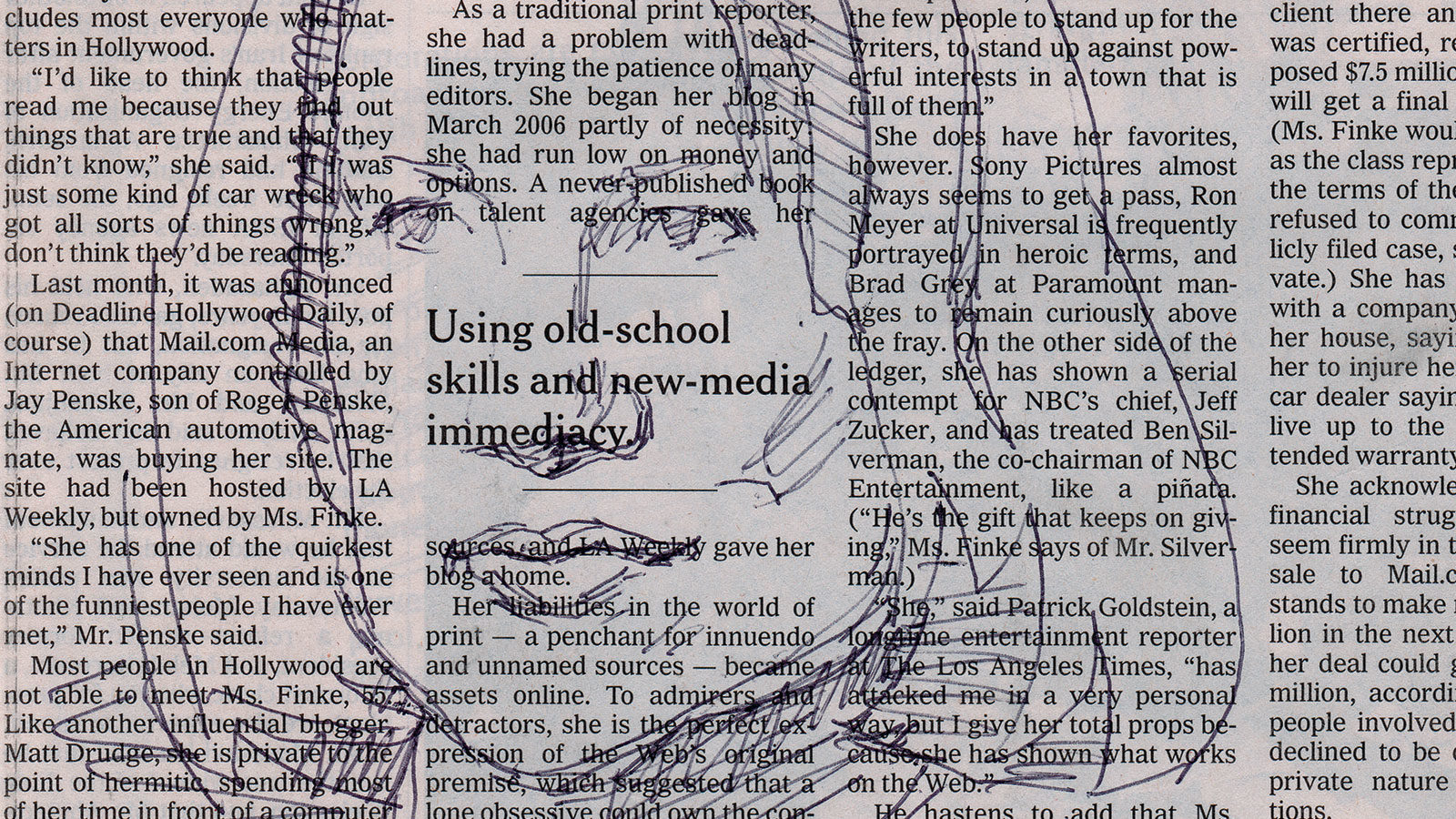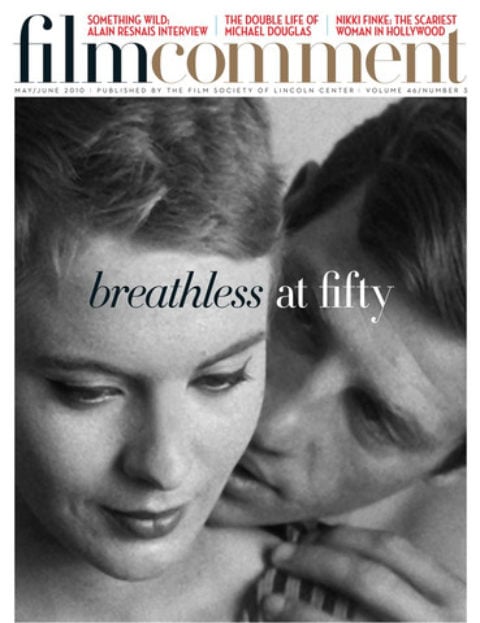By Roger Smith in the May-June 2010 Issue

The Most Powerful Woman (Make that Person) in Hollywood
You’ve never heard of Nikki Finke? Everyone in the movie business damn well has
For more than 40 years, we’ve been treated to a fairly regular stream of “The Most Powerful Woman in Hollywood” stories. Back in the Seventies, it was superagent Sue Mengers. In 1980, when Sherry Lansing became the first woman to head up production at a major studio (Fox), it was headline news. A bit later, Dawn Steel and then Amy Pascal successively wore the crown (at Paramount and Columbia respectively). But they had to become studio heads, with that all-important moviedom talisman—the ability to greenlight pictures—in order to earn the recognition. Nikki Finke is a blogger, posting furiously from an undisclosed West Los Angeles location, fer crissakes, in a town that heretofore has ranked journalists somewhere below failed screenwriters and above incompetent press agents in the industry power structure.

From the May-June 2010 Issue
Also in this issue
Her website, Deadline Hollywood Daily, provides industry insiders plus thousands of curious outsiders with a daily dose of film-biz rumors, hard financial news, and some of the most opinionated, snarky, scatological, downright vicious but wildly readable reportage about the latest dealings in the corridors of power in the film and television business. CEOs and mere Exec VPs spend a healthy percentage of their working day trying to avoid incurring her wrath, or actively courting her favor, often by supplying negative stories on competitors—or even co-workers. While she has nearly 30 years of solid journalistic credentials, her extraordinary rise to this current position of power has taken place in the last four years. In 2006, she moved her “Deadline Hollywood” column, which had appeared in the alternative freebie paper LA Weekly (owned by The Village Voice and characterized by Finke as “The Official Paper of Valet Parkers”) since 2002, onto the Web. What followed is an almost paradigmatic example of the Internet’s power to create—and to destroy.
The through-the-looking-glass world of Internet journalism is reflected in the names of the former employers on Ms. Finke’s CV (in chronological order): the London and Moscow bureaus of the AP, Newsweek, The Los Angeles Times, The New York Observer, New York magazine, The New York Post—whom she successfully sued for wrongful termination—and LA Weekly. In terms of the now-outdated old media, this might seem an almost perfect downward career trajectory. But in fact it was at the freewheeling LA Weekly that Finke was able to finally give full voice to her talents for innuendo, unnamed sources, and personal invective—qualities that would fully blossom for a larger audience on her website. And, critically, her blasts now were appearing up to 10 times a day, not once a week. If you “subscribe” to Deadline Hollywood (like virtually all Web content, it’s free), you’ll receive at least half a dozen alerts a day of breaking news. That news may not always be earth-shattering—the signing of a second-tier name to direct the sequel to a second-rate movie—but you will be getting it right away, something that clearly matters to many Hollywood players.
The website’s audience was, in its first year, limited to insiders and devoted followers of industry tittle-tattle. It was with the Writers Guild strike in the fall of 2007 that Deadline Hollywood found its voice—and its traffic. Finke’s dogged pursuit of every detail of the protracted negotiations produced some genuine journalistic coups, partially thanks to the inertia of the mainstream media and the trade press. Finke blamed this failing not on inertia, but on the ad-supported media’s supine position to the studios, whereas her strike coverage demonstrated her lack of economic dependence on the industry. While both Variety and The Hollywood Reporter publicly proclaim that their reporting on the business is not influenced by their clear dependence on the film and television companies for their livelihood, simple logic—and some highly credible deep background comments—suggest otherwise. What modest ad revenues Deadline Hollywood does have come from a generic list of consumer advertisers, not the industry. Thus Ms. Finke had no built-in reason to fear showing her considerable sympathies with the writers. Besides, she doesn’t do fear. To her credit, her demonstrable allegiance did not diminish the quality of her coverage.
By 2009, Finke had evolved from powerful journalist to serious industry player. The evidence of this emerged during the extended merger negotiations involving the venerable but declining William Morris Agency and the smaller but rapidly rising Endeavor. The younger firm’s head, Ari Emanuel (the thinly veiled model for Ari Gold in HBO’s Entourage), was widely believed to be feeding Finke information as a way of steering the negotiations in Endeavor’s favor, especially with a view toward the ultimate shape the merged agency would assume. Her repeated attacks on the senior management of WMA—“Dave and Jim have failed as leaders” is just a sample—and her general denigration of the agency left most neutral observers with the impression that the company was in dire straits and had little choice but to accept whatever terms Endeavor was offering. Subsequent events have more or less borne this view out, as what had originally been seen as a merger of equals in fact became very much a takeover of William Morris by its smaller but spunkier rival.
Indeed, perhaps the best illustration of the power that Finke and Deadline Hollywood had accrued by 2009 came from a story posted on a “fake news” Hollywood website just prior to the announcement of the actual close of the WMA/Endeavor deal. Headline: “WMA and Endeavor nix merger just to prove Nikki Finke wrong.” A sub-head added: “’Her shrill reign of terror has gone on long enough’ say agency officials.”
Well, power is nice, but the true measurement of power in Hollywood has always been money. The Internet may be causing massive agita among press barons and other media moguls—but it has yet to evolve its own working business model. The current one, employed by nearly every “content” website save for The Wall Street Journal and a few other special cases, is one of free access to the material produced, with typically modest advertising revenue offsetting some of the costs. Showing her customary shrewdness, in mid-2009 Finke convinced auto heir Jay Penske, flush with $35 million in recently raised venture capital, to buy the Deadline Hollywood website—of which Finke had, again shrewdly, retained sole ownership, despite its LA Weekly origins. While no precise figure has been confirmed, the best guess is that she got several million dollars upfront, with at least $5 million more as payment for her services over the next five years, plus a piece of future ad revenue. While these are not numbers to make David Geffen jealous, they certainly remove Finke from the ranks of whatever the Internet equivalent of ink-stained wretches may be.
Now armed with two things few working journalists, if any, have ever enjoyed—total financial and editorial freedom—Finke set out to prove correct Lord Acton’s dictum about absolute power. And she did it at Internet warp speed. October 2009 was a big month for her. Her well-developed habit of picking certain high-level executives and building a steady drumbeat about their professional and personal failings reached its acme with her ultimately successful campaign against Marc Shmuger, one of Universal Pictures’ two chairmen. Of course her vividly expressed contempt for him (“He . . . is just a polarizing asshole”) wasn’t the outright cause for his termination—her style, in common with generations of schoolyard bullies, is to pick on someone with demonstrable weakness. But the outcome underlined the real source of her power: the absurd degree of insecurity in major studio and TV network executive suites.
One of the great truisms of the movie business is that senior management is never fired for incompetence. It is invariably because the individual has broken one or more of the byzantine and usually opaque rules of its politics. Yes, Shmuger had presided over a nearly disastrous run of pictures in 2009—one that is continuing this year as his team’s selections are released. But his boss, Ron Meyer, was quoted by The Los Angeles Times assuring “close associates that he would never fire [Shmuger] over a bad slate of films.” Meyer, who has held his job atop the entire Universal empire since 1995, an eternity in modern Hollywood terms, went on to suggest that no one could be expected to be able to assess “difficult-to-gauge audience tastes.” Funny, I thought that was precisely why these jobs carried $5-plus million salaries and perks that would embarrass Donald Trump.
But the event that made this past October the capstone of Finke’s career was a mostly complimentary seven-page profile that ran in The New Yorker, sub-headed “Why Hollywood Fears Nikki Finke.” Now, most of us mere mortals would regard such coverage as a heady tribute. Not the redoubtable Ms. Finke. The profile’s appearance occasioned a profanity-laden broadside from her, in which she proudly and flatly asserted that “The New Yorker didn’t lay a glove on me.” The writer, Tad Friend, she found “easy to manipulate.” Editor-in-chief David Remnick was described as “this New Jersey dentist’s son.” Finke then detailed, with what I am told is reasonable accuracy, The New Yorker’s willingness both to accept some stringent upfront conditions she had set and to make changes in the draft to accommodate several Hollywood power players. She concluded with advice to future New Yorker profile subjects: “You, too, can make The New Yorker your buttboy. Just act like a cunt and treat Remnick like a putz and don’t give a fuck.”
So what does this all say about today’s movie business? Nothing that couldn’t have been said about it at almost any time—with a few key differences. Louis B. Mayer may have been the highest-paid executive in America, but he had a boss and could be fired—and was, unceremoniously. Hedda Hopper and Louella Parsons were also employees, but much further down the food chain, and ultimately working for both their press overseers and the studios. (Tad Friend made this comparison, and received a raft of feminist complaints for what was seen as an inapt analogy. I agree. Walter Winchell and Westbrook Pegler are far better correlatives—and will, I trust, keep me out of trouble with the gender-bias police.) Finke’s MO is a time-honored one: for fear of becoming a target, high-level sources feed her fairly juicy stuff, hoping to placate her. If those sources are expecting long-term loyalty, or even semi-permanent placation, they had best reevaluate those expectations.
Of course, this is also a case study in the Internet’s extreme degrading effects on journalism—both its ethical standards and its very economic basis. What Nikki Finke has done is combine a deep knowledge of her subject—the business of Hollywood—with a laser-like sense of people’s insecurities and the fact that the instantaneous presentation of “news” 24 hours a day values speed over accuracy, “readability” over thoroughness, and downright thugishness over professionalism. With near-perfect timing, her online dispatches have provided an alternative to spending 30 minutes or so a day reading the trades. Variety and The Hollywood Reporter are chopping staff by 50 percent in a desperate attempt to stay ahead of precipitous drops in ad revenue—an effort that may or may not succeed in saving franchises that are 105 and 79 years old, and until quite recently, almost invariably profitable.
But there is also a very real question as to whether the blog business model can be sustained over time. Deadline Hollywood, bolstered by Penske’s cash, has recently stolen three top journos: one each from Variety and The Hollywood Reporter, plus a senior London-based entertainment writer, the beginnings of building a serious staff and its attendant costs. Whether the website’s ad revenues alone will cover those costs is highly doubtful. And should Deadline Hollywood, down the road, choose to erect a “pay wall,” will it see its traffic decimated?
But until the (by Finke’s claim) million or so unique monthly visitors that click on Deadline Hollywood are asked to pay, they can continue to enjoy, gratis, Finke’s near-patented style of innuendo, unsourced quotes, outright vilification, and attempts to redact her mistakes into “updates.” It appears that the Internet, Hollywood, and Nikki Finke were made for each other.







